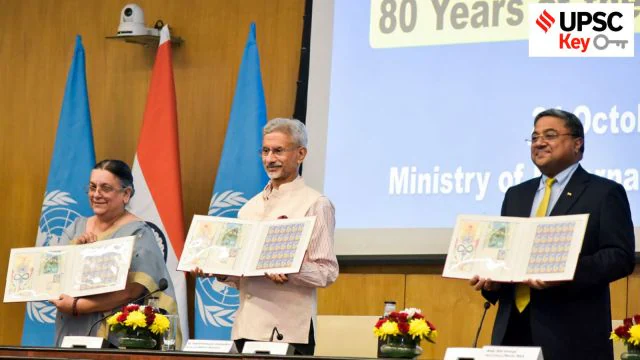As the United Nations (UN) marks its 80th anniversary, India’s governance and policy circles are reflecting on global multilateralism, domestic justice reforms, and advancements in infrastructure monitoring. These topics — the UN’s evolving role, judicial pendency, and Network Survey Vehicles (NSVs) — are central to understanding India’s administrative and developmental priorities, making them crucial for UPSC aspirants and policymakers alike.
United Nations at 80: Reflecting on Global Relevance
Established in 1945, the United Nations has played a defining role in global peacekeeping, humanitarian aid, and international diplomacy. As it turns 80, debates around its relevance, reform, and representation have intensified, particularly with India’s longstanding demand for a permanent seat at the UN Security Council.
Experts note that while the UN remains vital for conflict resolution and global cooperation, it faces challenges in adapting to multipolar geopolitics and addressing non-traditional threats such as cyber warfare, climate change, and pandemics. India continues to advocate for UN reforms to reflect the realities of the 21st century.
Pendency in Indian Courts: A System Under Strain
India’s judiciary is grappling with a mounting pendency crisis, with over 5 crore cases awaiting disposal across all levels of courts. The Supreme Court, High Courts, and lower courts face delays caused by vacant judge positions, inadequate digital infrastructure, and procedural inefficiencies.
The government and judiciary have introduced initiatives such as virtual hearings, fast-track courts, and the National Judicial Data Grid (NJDG) to enhance transparency and speed up case resolution. However, experts argue that a deeper systemic reform—including better case management, increased manpower, and alternate dispute resolution mechanisms—is essential to restore efficiency and trust in the justice system.
Network Survey Vehicles: Transforming Road Quality Assessment
India’s road infrastructure is undergoing a technological upgrade with the deployment of Network Survey Vehicles (NSVs). These high-tech machines, equipped with laser sensors, high-resolution cameras, and GPS mapping tools, are used by the Ministry of Road Transport and Highways (MoRTH) to assess road conditions, measure surface quality, and monitor maintenance needs in real-time.
The initiative aims to ensure data-driven road maintenance and enhance transparency in infrastructure projects, reducing human error and improving accountability. NSVs represent India’s broader push toward smart governance and infrastructure automation.
Why It Matters for UPSC Aspirants
These three topics—global governance (UN reforms), domestic justice delivery, and technological modernization in infrastructure—are critical for UPSC General Studies Papers II and III. They connect global diplomacy with governance reforms and technological interventions, forming the backbone of India’s evolving administrative narrative.



